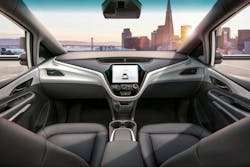Viewpoint: IPO Is First Stop for GM Self-Driving Unit
General Motors Co. is going the distance with autonomous cars.
As reported by Bloomberg News last week, the automaker is contemplating strategic options for its Cruise autonomous vehicle unit including a public stake sale and a tracking stock. A decision isn't imminent as GM first wants to position the business for commercial success, but a conversation about a public-market future for Cruise is in itself notable, especially coming on the heels of SoftBank Group Corp.'s $2.25 billion investment in the business. It's a testament to how far GM has come in the battle for self-driving leadership, but also casts an unflattering spotlight on rival Ford Motor Co.'s own adventures in autonomous vehicles.
GM acquired Cruise in 2016 for close to $1 billion after accounting for incentives for key talent. Ford invested $1 billion in self-driving startup Argo AI last year but has less to show for it. While GM thinks it can have a self-driving taxis on the road by 2019, Ford is aiming for a 2021 debut.
Ford says there's a method to the slowness. It's prioritizing a path to profitability over sheer speed. There's something to be said for such thinking as an increasing number of companies race to develop autonomous vehicles. They can't all win, so why not find a way to best capitalize on the technology once it exists? In this vein, on June 15, RideOS, a startup that’s developing route and dispatching software, announced a partnership with Ford's Autonomic unit. This follows Ford tie-ups with Domino's and Postmates to test autonomous delivery. It's in some ways reminiscent of the services offerings industrial companies rely on to offset low-margin product sales.
The question, of course, is whether the eventual leaders of Robo-taxi services will want to use third-party technology or just develop their own. Navigation services and delivery capabilities for self-driving cars are arguably as competitive an industry as the vehicles themselves. And the purported focus on profitable utilization of self-driving technologies isn't paying off yet, as spending remains elevated at Ford. A quick glance at Ford's stock performance relative to GM's tells you what investors think of the companies' comparative strategies.
And that brings me back to the idea of an eventual public-market option for GM's Cruise. Investors realize that self-driving technology is the future and GM's progress here has to give them encouragement, but they're less fond of the spending required to be competitive in this burgeoning industry. The business models of these traditional manufacturers don't engender giant leaps of faith on the part of investors, especially in cases like GM where you have a history of bankruptcy. Separating out the Cruise Automation business would help diffuse this tension and give the unit more financial flexibility.
But any kind of stake sale or tracking stock would be only a temporary solution. Overly complicated structures eventually become a drag on valuation. Of note, GM used a tracking stock for its Hughes Electronics business. The defense part of Hughes was spun off and sold to Raytheon Co. in 1997, while the automotive-electronics part was folded into GM's Delphi Automotive, which itself was later spun off. GM sold its stake in the tracking stock for the remaining telecommunications piece to News Corp. in the early 2000s. That business eventually become DirecTV, which was purchased by AT&T Inc. in 2015.
In that light, it's easy to envision a publicly listed GM Cruise business eventually becoming a takeover target or merging with another self-driving venture once the winners and losers of this race get sorted out. If GM keeps up the current momentum, it's more likely to be negotiating the future for Cruise from a position of strength.
By Brooke Sutherland
